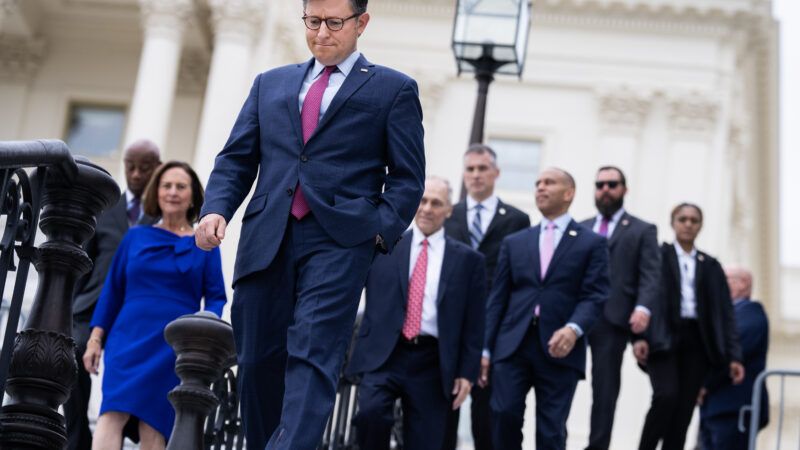Congress Fails the Budget Test, Again
Despite promises to pass orderly budgets, the House GOP is poised to approve yet another stopgap spending measure.

In theory, Congress is supposed to pass 12 appropriations bills by the end of each fiscal year to fund discretionary spending on defense, as well as non-defense programs like veterans' benefits, education, transportation, and health. In practice, that hasn't happened in more than a quarter century. This year will be no different.
Despite repeated promises to return to a more orderly annual budget process, funding the federal government for three months with a stopgap measure, known as a continuing resolution (C.R.), is the best that Congress can muster.
Over the weekend, Speaker of the House Mike Johnson (R–La.) introduced a C.R. that would avert a government shutdown by "continu[ing] current funding levels through Dec. 20," reports Roll Call. Johnson described the 12-week plan as "a very narrow, bare-bones CR including only the extensions that are absolutely necessary."
The three-month C.R. is a bipartisan compromise on the six-month C.R. that died on the House floor in a 202-220 vote on Wednesday. The C.R. presently under consideration excludes $10 billion for the Federal Emergency Management Agency and $1.95 billion for the Virginia-class submarine program, as sought by Democrats and Republicans respectively, but retains "$231 million in new appropriations for the Secret Service to provide protection for presidential candidates," per Roll Call.
It's a resounding yet predictable failure of one of Congress' most basic constitutional responsibilities: "to lay and collect taxes…to pay the debts and provide for the common defense and general welfare of the United States," as described in Article I, Section 8 of the Constitution.
When Johnson became Speaker of the House, he promised a return to "regular order"—the annual budget process established by the 1974 Congressional Budget and Impoundment Control Act.
But it has been 27 years since Congress has fully funded the federal government by October 1, reports Axios. In fact, not even half of the federal government has been funded on time since 1997.
It's pretty much guaranteed that Congress won't pass a single appropriations bill by October 1. Such a failure would not be an aberration but the "sixth year in a row" that Congress has done so, the Committee for a Responsible Budget (CFRB) laments.
According to the CFRB, Congress hasn't "had a real budget"—one conferenced by the House and Senate together—since the 114th Congress passed House Concurrent Resolution 27 for fiscal year 2016. The resolution provided a 10-year-long framework for federal spending, including a "point of order against increasing long-term deficits or direct spending"; subsequent reconciliation bills have included no such long-term plans and merely funded the short-term operations of the federal government.
Fully funding the government on time has long since stopped being the goal; that "has only happened four times in the 50 years of the current budgeting system," notes Axios. Instead, passing stopgap bills to avert a complete government shutdown is the norm.
With only a week left in the 2024 fiscal year, the House has passed exactly zero of the 12 appropriations bills. Legislators haven't even managed to pass the Legislative Branch Appropriations Act, which pays the salaries of congressional offices and funds the security and maintenance of the Capitol, never mind the rest of the federal government.
So much for an annual budget process.
The House GOP's budget headaches aren't new; lower chamber Republicans have struggled with the budget process for well over a decade. But they are telling.
Fundamentally, budgeting is a process of prioritization. There are no solutions; only trade-offs. The recurring failure to pass a budget shows that no one in Congress—and few in Washington, D.C.—seem to have any desire to make hard decisions.


Show Comments (35)